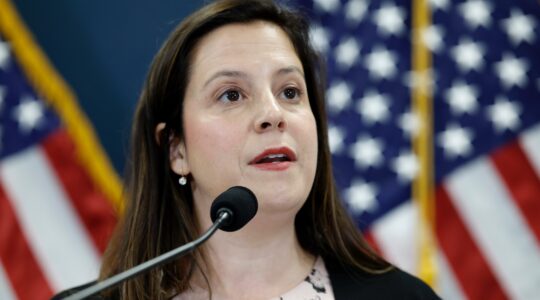WASHINGTON (JTA) — It was quintessential Herb Kohl: The Democratic U.S. senator from Wisconsin held up the entire U.S. budget — including billions in defense assistance to Israel — over dairy pricing reform.
The hold, lasting through a tense night of deal making in November 1999, might have damaged another senator with the pro-Israel lobby, especially any member of the body’s unofficial Jewish caucus. But Kohl was immune.
A department and grocery store multimillionaire and the owner of the NBA’s Milwaukee Bucks, he paid for his own campaigns, for one thing.
More important, Kohl was all about Wisconsin. And Wisconsin was all about Kohl, sending him to the Senate four times with increasingly large majorities.
“He’s an extremely popular man in Wisconsin,” said Hannah Rosenthal, the State Department’s envoy for combating anti-Semitism, who has known Kohl since her own days in the state’s politics.
In his last election, in 2006, Kohl received 67 percent of the vote in a state that is otherwise “purple” — swinging between Democrats and Republicans.
Announcing his decision not to run for re-election in 2012 last Friday, he made clear that his age, 76, was a factor.
“I’ve always believed it is better to leave a job a little too early than a little too late,” Kohl said. “The interest and energy I had for this job will find a new home.”
The decision has worried Democrats, who already were facing a tough season in 2012, with the likelihood that they will lose their three-seat majority in the Senate. They were swept out of the U.S. House of Representatives last year.
Kohl’s departure could end an anomalous chapter in American politics: From 1993 until last year — when Democrat Russ Feingold was defeated — Wisconsin was represented by two Jewish senators even though its Jewish population barely tops 20,000 in a state with 5.65 million people. (Neighboring Minnesota, with a similarly small Jewish population, also has had at least one Jewish U.S. senator continuously since 1978.)
Kohl, elected in 1988, was the state’s first Jewish senator. Feingold has been touted as a possibe candidate to replace him in 2012. So have Reps. Tammy Baldwin, a Democrat, and Paul Ryan, a Republican.
Rosenthal said the pre-eminence of Jews in Wisconsin politics was grounded in the same reasons that Jews have played prominent roles in national politics: an attraction to involvement in government and public life.
“Herb had been chairman of the state Democratic Party, he had worked hard on building the party, so it was natural that he wanted to actualize the Democratic principles he had worked on,” she said.
In Wisconsin, it never seemed to matter much that both senators were Jewish, she said.
“It was a bigger deal for the Jews here,” in Washington, she said.
Kohl was best known for constituency politics, making time for muffins and coffee with visitors between 9 and 10 each morning, recalled a former chief of communications, Brad Fitch.
“Trying to drag Herb for a hearing away from those breakfasts was impossible,” said Fitch, now the president of the Congressional Management Foundation, a nonprofit group striving for better government.
Kohl’s passion was children, said Fitch, although he was single and childless.
“There was always one constituency that everyone in the office knew was more important to Herb than anyone else, and that was children,” Fitch said. “He would say, ‘They don’t contribute to campaigns, they don’t have a lobbyist.’ ”
Kohl authored bills that expanded funding for school lunches and mandated child-safety locks on guns.
He also was well known for his advocacy for the aged, authoring bills facilitating access to generic drugs and chairing the special committee on aging.
It was those passions — protecting children and the aged — that drew Jewish groups such as the Jewish Council for Public Affairs and the Jewish Federations of North America into Kohl’s circle.
“His focus has been on children and fairness, whether it’s taxation or providing projects and programs to people in need,” said Rosenthal, who directed the JCPA, the umbrella body for public policy groups, in the early 2000s.
William Daroff, the Washington director for JFNA, noted Kohl’s closeness to the Milwaukee Jewish Federation, where he has addressed audiences.
Kohl “is a particularly helpful leader for the Jewish community on senior transportation issues,” said Daroff.
Jared Feldman, the deputy director of the JCPA’s Washington office, said Kohl in recent years had accepted questions from the group to be posed to Supreme Court nominees — Kohl was a member of the Senate Judiciary Committee.
Other than those interactions, Kohl’s Jewishness was muted, according to colleagues and associates in Milwaukee and Washington.
“He didn’t talk about his faith much, except for being mindful of the Jewish holidays,” Fitch said.
Kohl grew up in Milwaukee’s Sherman Park neighborhood, once the city’s Jewish redoubt, and maintains close friendships with other Jewish kids from the neighborhood, including Bud Selig, the Major League Baseball commissioner, and Steve Marcus, the board chairman of the Marcus Corp., a cinema and resort giant.
Fitch said a key to Kohl’s appeal was being able to communicate in the straightforward manner of a Midwesterner. He recalled reviewing videotapes when he first took the job running Kohl’s communications and being appalled at the senator’s inability to shape a sound bite.
“My first impression was this guy’s not a polished politician,” he said.
Fitch then figured out that Kohl came across more naturally in long-form interviews.
“I had never seen someone that authentic in politics,” he said.
Sen. Carl Levin (D-Mich.), perhaps the Jewish colleague closest to Kohl, said to JTA in a statement that Kohl’s career had improved lives.
“There are family farmers whose way of life is more secure because of his support for rural communities; seniors who have better access to affordable prescription drugs because of his health care advocacy; children who have access to healthy meals because of his work to build child nutrition programs; workers whose jobs are more secure because of his support for American manufacturing; and neighborhoods that are safer and families more stable because of his work to bolster juvenile justice and rehabilitation programs,” Levin’s statement said.
Kohl is noted in Wisconsin for his philanthropy, donating $25 million to his alma mater, the University of Wisconsin at Madison, to build a sports arena and setting up a grant foundation for the state’s schools and students. He purchased the Bucks in 1985 in order to keep them in the city.
Another former communications staffer, Zachary Goldberg, said Kohl’s Judaism played out through his philosophy of protecting the vulnerable.
“He really understood the concept of tikkun olam,” the Talmudic concept of repairing the world, said Goldberg, who now works for M & R, a firm that runs advocacy campaigns. “He was the definition of a mensch.”
JTA has documented Jewish history in real-time for over a century. Keep our journalism strong by joining us in supporting independent, award-winning reporting.





